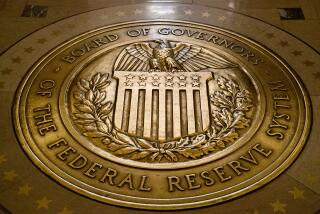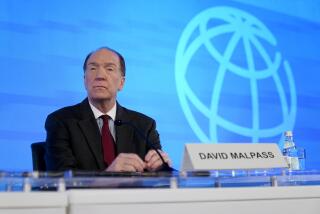A Search For Vigor
- Share via
The Reagan Administration appears to have developed a new appreciation of the value of the World Bank at a propitious time, for nominations are now open for the presidency of the bank. The position is reserved for an American, and the choice of the U. S. government usually prevails.
There are two crucial considerations. A strong financial leader is essential, a person with the ability to produce international support for an innovative and expanding program for the bank, is fundamental. But there must also be strong financial and program support from the United States if this great institution is to continue its successful work.
Washington’s new appreciation of the World Bank has come only in the year since James A. Baker III became Secretary of the Treasury. He has given the World Bank a key role in his strategy for addressing the global indebtedness of the developing nations. And, at the recent conference on replenishing funds for the bank’s important International Development Assn., U.S. delegates supported full replenishment at $12 billion.
The discovery of the utility of the bank is not unlike the Reagan Administration’s tardy discovery of the importance of the International Monetary Fund when American banks were beginning to be besieged by the debt crisis of the Third World. Until that reality was brought home to major American financial institutions, the administration has preferred to follow an ideological line that all multinational institutions are to be treated with suspicion.
There remain, among those being considered for the presidency of the World Bank, several candidates thought to be of that radical right mentality, believing that less is beautiful, that foreign aid and development assistance are suspect. Some political elements that have never seemed to like the bank are pushing hard, at any rate, for J. William Middendorf II, presently U.S. ambassador to the European Economic Community, or William E. Simon, former Secetary of the Treasury, now on Wall Street.
A long list of candidates, more likely to sustain the broad international commitment and growth of the bank, also is reported to be under consideration. Among the outstanding candidates are John M. Hennessy, a former Treasury Department staffer now president of Credit Suisse First Boston in London, and John C. Whitehead, deputy secretary of state, formerly managing director of Goldman, Sachs.
A. W. Clausen will leave the presidency of the bank at the end of June. His years have seen growth of the bank, but he lacked the innovative and aggressive leadership of Robert S. McNamara, who preceded him. Clausen came with high credentials in world finance as chief executive of Bankamerica, but the handicap of lagging U.S. government support dogged his term. His successor will need assurances of real support from the administration that names him if he is to succeed.
The rediscovery of the value of the World Bank, and IDA, its concessional-loan arm, are important developments. During its 41 years of operation, the bank has made more than $113 billion in loans to developing nations, and an additional $37 billion through IDA. The bank obtains most of the money for its development loans through borrowing on private capital markets while IDA relies on funds from the industrial nations of the world. The bank and IDA play a critically important role in development in the Third World, sometimes making the difference between hope and despair, a demonstration of the capitalist system in effective application to fundamental needs.
The relatively modest investment of the rich nations brings huge dividends measured in terms of stabilization, both political and economic, and creation of vast export markets that are the world’s greatest growth areas. It is, clearly, money well spent, the better when in the hands of the best executive possible.
More to Read
Sign up for Essential California
The most important California stories and recommendations in your inbox every morning.
You may occasionally receive promotional content from the Los Angeles Times.










